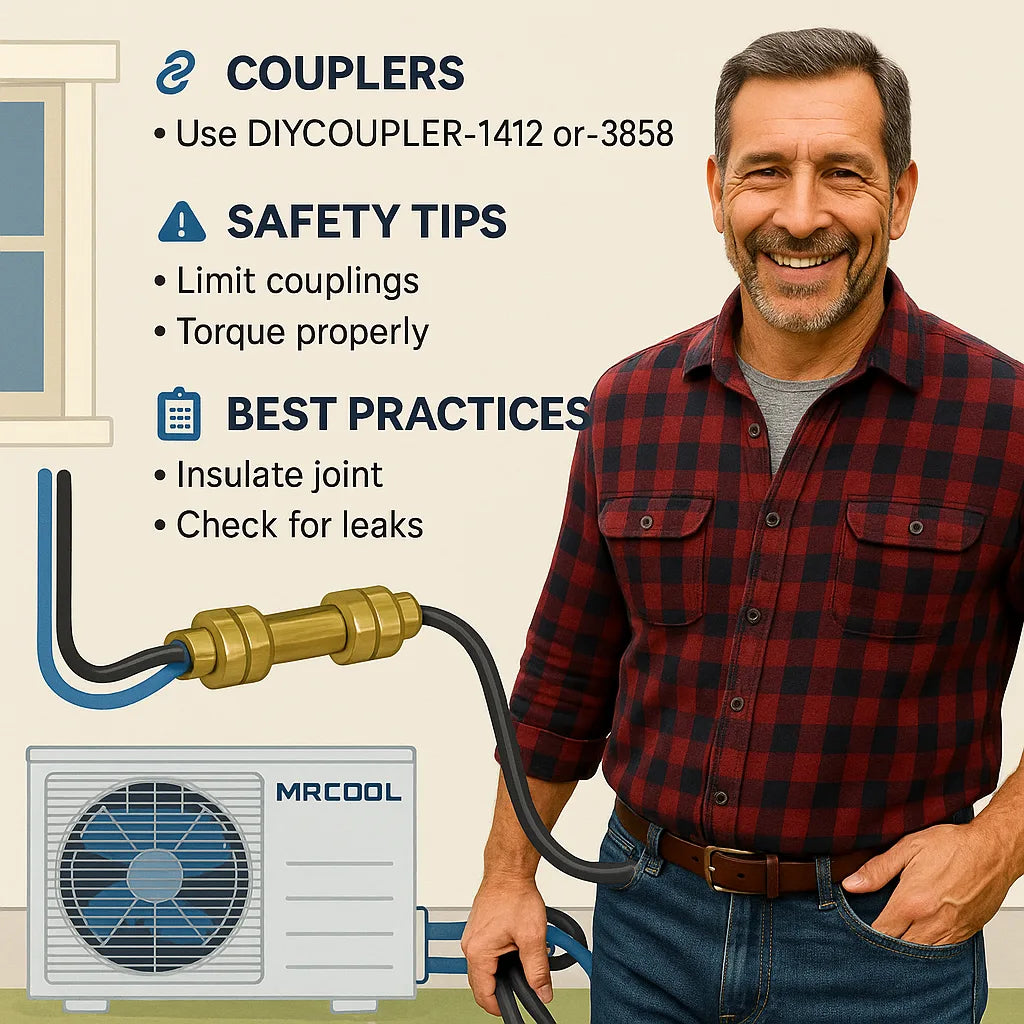Couplers, Safety & Best Practices for DIYers 🛠️
1. Why Extend a Lineset?
-
Longer-than-expected runs: attic spaces, detached structures, or tricky home layouts
-
Avoiding replacements: mix & match lengths rather than buying a single long segment
-
Flexibility: allows tweaking of runs over time
While MRCOOL recommends one-piece line sets up to ~75 ft, couplers let DIYers go further when needed.
2. Official MRCOOL Coupler Kits
2.1 Models & Sizing
-
DIYCOUPLER‑1412 (¼″–½″) for typical 9k–18k systems
-
DIYCOUPLER‑3858 (⅜″–⅝″) for larger 24k–36k zones (Couplers & Fittings)
2.2 What’s Inside
-
The coupler body with quick-connect flared fittings
2.3 Compatibility
-
Designed for MRCOOL Quick‑Connect, pre-charged R‑410A and R‑454B linesets (Line Set Coupler Kit – For All DIY Pre-Charged Systems (R-410A & R-454B))
3. How to Install a Coupler: Step-by-Step
-
Match sizes: choose coupler for your lineset diameter
-
Connect fittings: thread line ends into coupler with wrenches until fully seated (DIY35-1412C 35' Pre-Charged Line Set 1/4"-1/2")
-
Insulate: slide the grey sleeve over the joint; seal edges and tape securely (MRCOOL® DIY® COUPLER)
-
Pressure-test: use soapy water—check for bubbles
-
Coil excess cable: store behind outdoor unit; secure every 4–6 ft (Installation & Owner’s Manual)
4. Safety & Performance Guidelines
-
Limit couplers: ideally one per zone; more adds risk of pressure loss or leaks
-
Torque correctly: over- or under-tightening can cause failure MRCOOL
-
Protect from kinks/vibration: avoid tight bends; secure with clamps
-
Monitor condensate and uphill runs: avoid trapping oil or losing efficiency Doxrepo
5. Testing & Verifying
-
Leak test: after connection and again after opening service valves
-
System run-in: observe pressure, temperatures, even sound
-
Periodic checkups: inspect coupler annually, especially post‑extreme weather
6. Troubleshooting Tips
| Problem | Possible Cause | Solution |
|---|---|---|
| Leak at coupling | Improper torque or debris on threads | Re-tighten per torque chart; clean debris |
| Insulation sweating | Missing grey sleeve, poor insulation | Re-insulate thoroughly |
| Pressure drop | Multiple couplers or long run | Avoid multiple couplings; shorten run if possible |
| Cable interference | Control wire improperly bundled | Coil separately; no crossing with refrigerant pipes |
7. Real-World Example
-
Mike’s Shop Add-on
Indoor unit to detached garage = 60 ft distance.
He connects a 35 ft lineset to a 25 ft set using a DIYCOUPLER-1412, wraps the joint in insulation, secures cables every 5 ft, and tests for leaks—done in an afternoon.
8. Compliance & Warranty
-
Warranty safe: MRCOOL supports use of official couplers—following instructions keeps warranty intact
-
No refrigerant licensing: Quick‑Connect kits avoid EPA Section 608 concerns
-
Stay within limits: Observe MRCOOL’s overall max run lengths—typically 73.8 ft per indoor unit, ~221 ft total for multi‑zone systems
10. Final Word for Mike
Yes—you can connect MRCOOL linesets, safely and effectively. Here's what matters most:
-
Use official couplers (DIYCOUPLER‑1412 or 3858)
-
Match line sizes to your equipment
-
Tighten properly, insulate joints, test carefully
-
Limit couplings, secure runs, follow torque specs
-
Check regularly for leaks or insulation wear
Get it right, and you'll stay cool—without calling the pros.
In the next topic we will read more about: Installing the DIY50‑1412C Pre‑Charged Lineset







